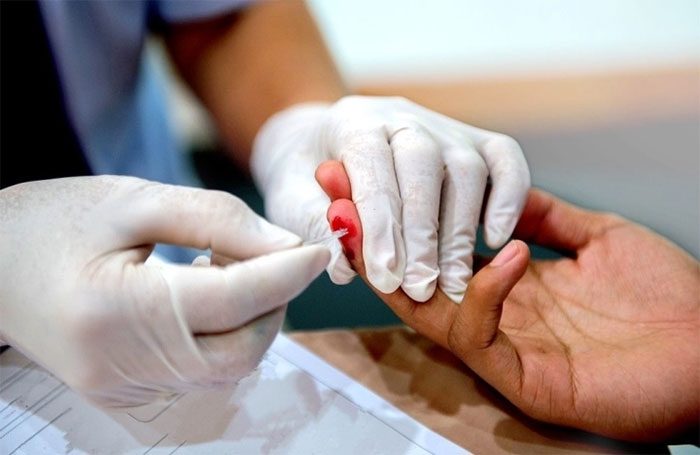According to Decision 2674 issued by the Ministry of Health in 2018 regarding national guidelines for HIV testing, community-based HIV screening includes three methods: self-testing, testing conducted by non-laboratory personnel, and testing performed by trained laboratory staff.
Three Methods of Community-Based HIV Testing

HIV testing through blood or bodily fluids. (Image: Getty).
Self-Testing: Individuals perform all steps of the testing process themselves, including sample collection, conducting the test, and interpreting the results. The results are intended for initial screening purposes only and should not be used for diagnosing HIV infection. In cases of reactive results, confirmatory HIV testing should be conducted according to regulations at a healthcare facility.
Testing by Non-Laboratory Personnel: This method is performed by community health workers, village health staff, or healthcare providers who are not specialized in testing and do not work in HIV testing facilities but have received training in HIV testing. Counseling and sample collection must occur in a clean, comfortable, well-lit area that ensures privacy for the clients.
With this method, if the test result is negative, the staff will provide counseling and inform the client of the results. If the test result is reactive, counseling and referral to a healthcare facility for confirmatory HIV testing should be conducted as per regulations.
Testing by HIV Laboratory Personnel: This method is conducted by trained laboratory staff from approved testing facilities. If the test result is negative, the laboratory personnel will provide counseling and inform the client of the negative result. If the test result is reactive, the staff will collect blood or refer the client to a healthcare facility for confirmatory testing according to regulations, and schedule a follow-up for results.
Who Should Be Counselled for HIV Testing?
According to the HIV/AIDS treatment and care guidelines issued by the Ministry of Health in 2021, the following individuals are recommended for HIV testing counseling: people with high-risk behaviors for HIV infection (men who have sex with men, drug users, sex workers, transgender individuals), people with tuberculosis; individuals with sexually transmitted infections; and those infected with Hepatitis C virus.
Additionally, patients undergoing clinical and laboratory examinations who do not have a clear diagnosis or exhibit symptoms suggestive of HIV infection, pregnant women, spouses/partners/children of HIV-positive individuals, and siblings of infected children may also be eligible for HIV testing.


















































